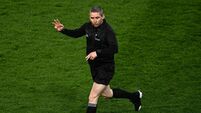'I kept being raped a secret until the burden was too much to bear'

Lucy Keaveney: "I have done what I can to talk openly about my experience in the hope that I can help others." Picture: Moya Nolan
I thought little about the man who raped me as a 12-year-old schoolgirl until I read of his death on Friday, December 30, 2022. I was then hit with a tsunami of emotions as I reflected on his death and the effect his abuse had on my life.
I read about it on RIP.ie and then I read all the tributes. Most were from people I did not know and were probably friends of his children. As I had gone public on the issue of my abuse in the past, I was disappointed that people could still treat him as an upstanding member of the community, but then this was probably a generation who knew nothing about his past. I have not lived in the area for decades, so this is understandable.











